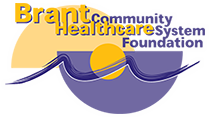12 DAYS OF GIVING
GRATEFUL PATIENT SPOTLIGHT
Gord Fairfield is a Grateful Patient…
When you’re experiencing a health crisis, you need to trust that the professionals looking after you know what’s best.
Gord Fairfield knows the staff at the Brant Community Healthcare System (BCHS) are knowledgeable and highly-trained to recognize the best methods for care. Gord needed their care when he realized his heart was regularly stopping, for seconds at a time.

Gord said he’d had this type of episode before, about once every couple of years, when his heart would beat irregularly, then pause for a few seconds and start back up again. But something happened in the fall of 2015 that caused the episodes to occur more frequently. To this day, he still isn’t clear what caused the increase in frequency, but it was becoming a serious concern.
“It would happen, and then it would be over so fast,” said Gord. “But when you get them four or five a day, then you start to wonder.”
In October, Gord recalls his heart was pausing as many as 15 times a day. Each time he felt a pounding heart beat for several seconds followed by a rush of blood returning to his head, then a period where he felt generally unwell.
Gord attended the emergency department at the Brantford General, but there was no clear diagnosis. He had a cough at the time and assumed he had a virus that was causing the problem.
Two days later, as the episodes gradually worsened, he tried to book an appointment to borrow a holter monitor that would record his heart activity over a period of time, with the intention of taking the results to his upcoming cardiologist appointment. But he was unable to secure a convenient date, and was still suffering from frequent episodes.
It was during a return visit to the Brantford General emergency department to inquire about a holter monitor that it became clear that Gord’s situation was serious.
In a letter he later sent to hospital administration to express gratitude, Gord explains that emergency department nurse Dianne Bonnyman asked for a detailed description of how and what he was feeling. He began referencing a written account he had prepared for his cardiologist, but Dianne urged him to tell her again in his own words. After he explained his symptoms, Dianne determined he needed to be re-triaged.
Minutes later, nurse Suzanne Butler had Gord hooked up to a single-lead ECG and a 12-lead ECG to record his heart’s electrical activity. She gave him the control button for the 12-lead and told him to press the button when he felt an episode coming on.
“Within 15 minutes, I pressed the button. A few seconds later, she was at my bedside with a thumbs up, saying, ‘We got it. Your heart stopped for seven seconds, and here is the ECG printout’,” Gord wrote in his letter.
He was able to see the printout showing his heart activity had stopped – or flat-lined – for a time.
“It was quite different from then on,” said Gord.
He was then seen by Dr. Donna Rowlands, who told Gord he needed to receive a pacemaker – a small device that’s placed in the chest or abdomen to help control abnormal heart rhythms.
“She explained that after any one of the 50-plus pauses, my heart might not start up again.”
Gord was taken to another area of the emergency department where Dr. Abayomi Ajayi and physician assistant Lauren Schoeman applied a temporary external pacemaker. This helped maintain a normal heart rhythm until Gord could be transferred to a regional hospital for the surgery to implant a permanent pacemaker. He was transferred within two hours and had surgery the same evening.
Gord hasn’t had another episode of his heart stopping since.
“I’ve been to the hospital a number of times and every time, I’ve had excellent care,” said Gord. “I couldn’t believe the amount of care and attention I received. The system really works.”
As Gord knows first-hand, when crisis or illness impacts you or a loved ones, the Brant Community Healthcare System (BCHS) is here to offer you exceptional healthcare in your time of need.
Please make a difference TODAY!
The equipment supported by donor dollars isn’t all ‘nice to have’ – it is critical, much-needed medical equipment required to perform daily diagnostics and care for our patients.
To make a donation, please call our office at 519-751-5510 or CLICK HERE to use our online donation form.


